Radio Review: The House of Don King (2024)
Partly a review of a new podcast series; moreso a review of Don King's life, career, and public perception.
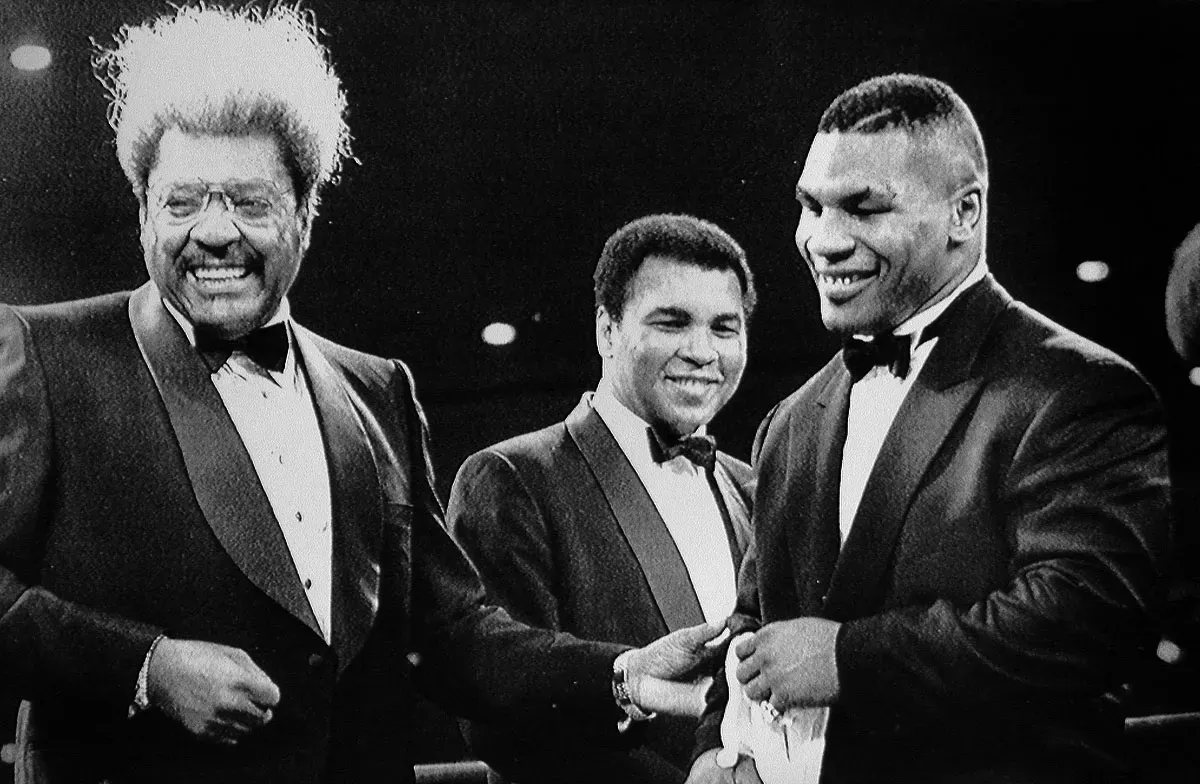
I make no bones about it and I'll say it with my whole chest: Don King is THE greatest boxing promoter who has ever lived. He is him. Despite this, he is also a very kickable figure in pop culture and supposedly professional circles. This documentary series is styled as being in the same vein as 2022's 'The House of Sepp Blatter', though that series was laser-focussed on narrative while this one very much feels like a podcast (derogatory).
The chatty frontmen are Steve Bunce and Lennox Lewis but it's painfully obvious when the champ is reading something that was written for him, which is what's he relegated to doing most of the time. Much of the series is Bunce just telling stories in his trademark protracted manner, except now with goofy sound effects – shotguns, sirens, phones ringing, crowd chatter, explosions etc – to make things sound that much cheaper.
The banter, the only reason to watch chat-oriented podcasts, is especially bad. Like this gem after recounting the famous story of Don King arriving in Joe Frazier's limousine and leaving in George Foreman's following the Sunshine Showdown:
Bunce: Could you do that, Lennox? If you came back into boxing to manage fighters and you managed to get two guys into a top position, could you do that at ringside? Could you be split fifty? Could there be a split down the middle? And you'd have the same feelings for both? Could you do it?"
Lewis: Ummm. You know, I've never been put in that position. It would be an unusual position for me. But ummm... I don't know if I could do it. I would have to be put in that position.
Riveting. This production just isn't as professional as the Blatter series. Buncey attempts to regale with stories of midcentury American crime and can't help but interject with meaningless asides like "I've always loved the indignation from criminals when they're under severe investigation. It's almost like they're saying 'it's an outrage, guv'nor! why can't we just get on with our business!?'" and "when [King signed over his numbers racket] it was with a guy called Virgil Ogletree, which is a great name".
The quips and tangents are as boundless as they are pointless and retread. We're told about how Don King was untouchable because he could charm juries and escape out of any situation. A man above the law. 10 minutes later we're told about his arrest, conviction, and 4-year imprisonment for manslaughter. Make it make sense, please.
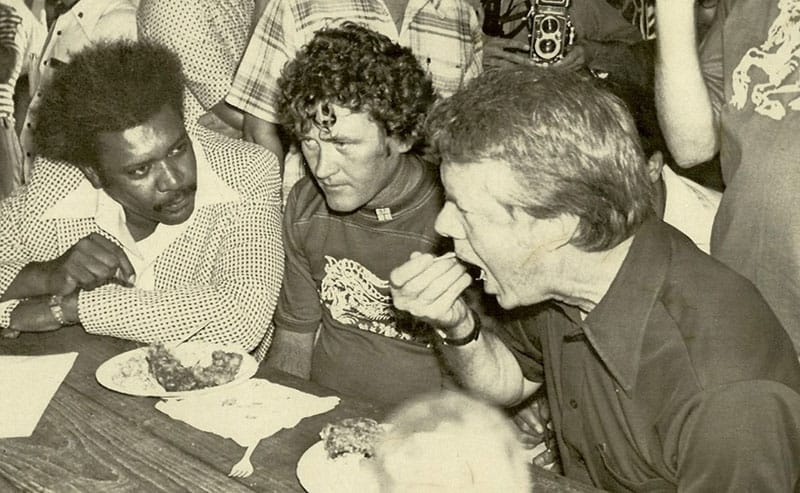
They do not make it make sense. They just move on to the next anecdote. Or the next paragraph of stats or prose to recite. Episode 3, King Makes The Rumble Happen, is less about King making 'The Rumble' happen and more about what happened in and around the fight, mostly through soundbites from any number of documentaries that also use archival material from that fight.
I know they have to explain the signficance of this event to listeners unfamiliar with boxing. But this principle is not consistently applied. The 'Thrilla in Manila', the most dramatic heavyweight fight of that decade and century, is rushed through in just 2 minutes. Much of the worthwhile explaining comes from contributors like Thomas Hauser. The real meat of this series is Bunce sniping at King till the cows come home.
Take Tyson's upset loss to Buster Douglas, for example. Bunce tells us Douglas "survived a savage knockdown in round 8, and a controversial knockdown in round 8" before haranguing King's response to the controversy:
"This is crazy stuff, Lennox, this is true. King grabbed a copy of the 8th round on video - the round where Tyson dropped Buster Douglas - and he took [WBC president José] Sulaiman and the Mexican referee, Octavio Meyran, into that room to view the Douglas knockdown. Now, this was straight after the fight. This is not me inventing it. And the reason they went into the room was so that King could persuade Sulaiman of the WBC that the fight should be declared a no-contest. It's hard to believe, isn't it? So he persuaded both the WBC and the WBA, this is the power of King when he needed to be at his most persuasive best. They suspended recognition of Douglas as the new world heavyweight champion. He just knocked out Mike Tyson in one of the greatest heavyweight fights in modern times and suddenly, what we saw wasn't what we saw. According to King."
Sorry for the wall of text. But it's a good reading exercise for if you want to play spot the fallacy. It's a well-known fact that Douglas received a long count after going down in the 8th round and was on the canvas for around 13 seconds. It's what everyone saw. You can see it for yourself if you look up the video. Yet according to Bunce, King is wrong to point out that the rules weren't properly applied.
If there are any lingering doubts over King's guilt, they're assuaded through guilt by association as we're reminded that Donald Trump was also sat ringside next to King. Oh the humanity! Don't concern yourself with trite details that "the master magician and manipulator" did not get his way and Douglas remained champion.
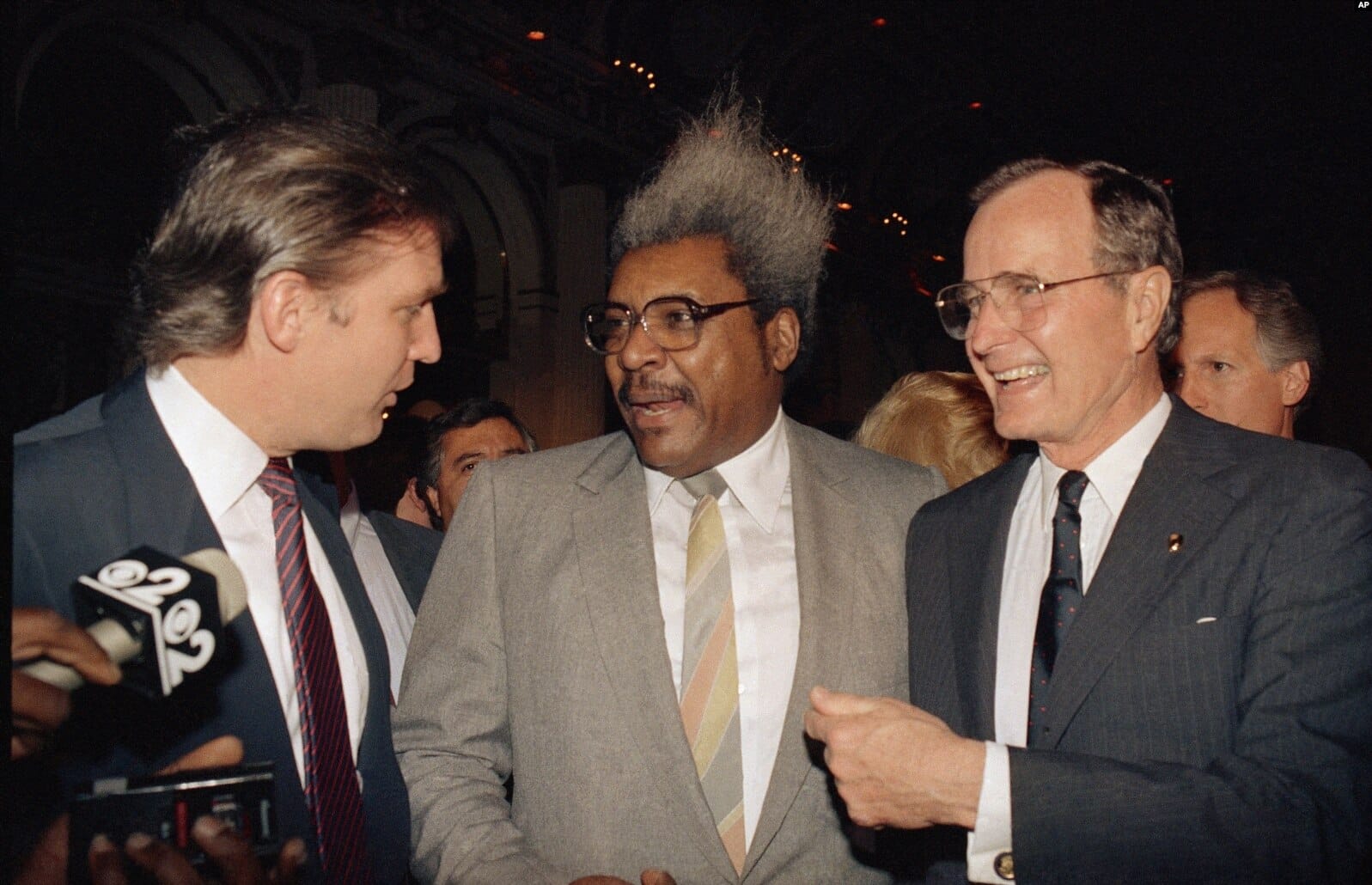
Of course, Don King has earned his deserved criticism. He's cheated millions of dollars, killed people, and can come across as an odious individual. But what major business leaders or politicians haven't? This isn't an exercise in whataboutism, it's asking why is Don King in particular worthy of so much scorn? I want to address the elephant in the room, one that Steve Bunce is incapable of sufficiently appreciating, which is that Don King is BLACK and was born in 1931. He grew up in a segregated society as a second-class citizen, was 24 years old when photos of Emmett Till's lynching appeared on magazine covers nationwide, this man did not have civil rights in the only land he had ever known until his mid 30s.
I bring this up not to excuse inexcusable behaviour, but to encourage a degree of understanding and contextualisation. Lennox Lewis twice brings it up as something King himself had remarked on and Lewis, who is himself black, had agreed with. But Bunce doesn't dwell on that salient point. In his opinion, King was a product of his circumstances. "It shaped him. All of this, didn't it? The violent, vicious, horrible life. Those two deaths. All those arrests. The prison time. That's what made the King we know."
There's never a moment of empathy. Buncey doesn't contemplate what (or who) shaped the environment or how such an environment would shape him if he had to survive those violent and vicious circumstances. He doesn't stop to think why the well-to-do white promoters of the past and present who lie, cheat, and steal don't get a bad wrap. Why would he? Don King is the bad guy. The cartoonishly evil one-dimensional villain. Everyone knows that. It doesn't matter how many of his self-declared enemies admit that they actually quite like him and think he's not that bad, his malevolence is always a foregone conclusion. His black heart speaks for itself.
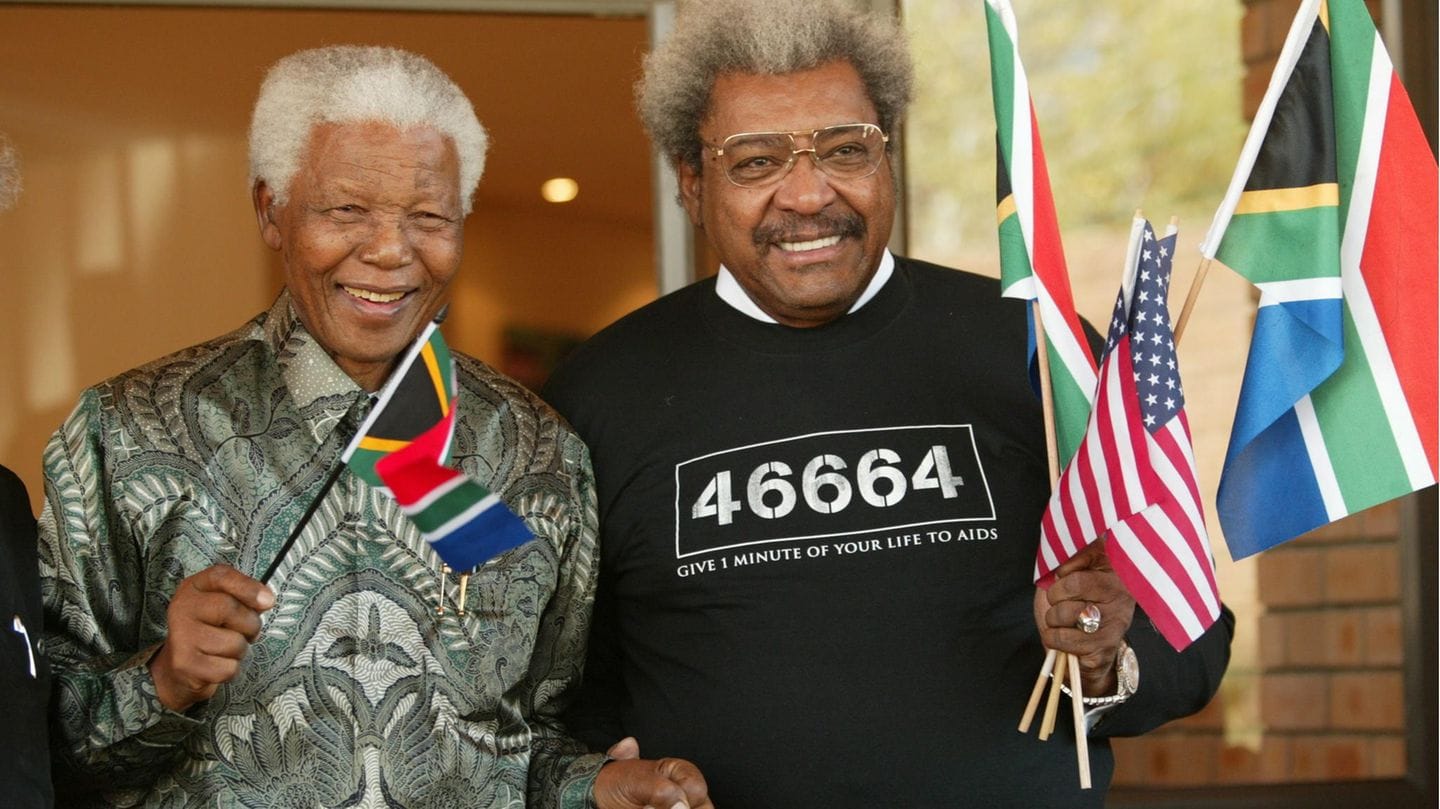
In Episode 5, we hear from Joseph Spinelli, as he tells a long yarn about how the feds almost got Don King in a sting operation. Almost. It doesn't matter that they didn't. For about a quarter of the episode we're treated to this FBI agent droning on about his decades-old Sports Illustrated article before revealing that nothing happened. The spook even admits that "Don King was right" when he said "I play by the rules. You know what the problem is, Joe? You don't like the rules."
Around the turn of the millenium the rules were changed when America's Congress passed an uncharacteristically pro-regulation law called the Boxing Reform Act. It's more popularly remembered as the Muhammad Ali Act — named after boxing's most sympathetic victim; aimed at boxing's most unsympathetic perp.
Among other things, it became "unlawful for a promoter to have a direct or indirect financial interest in the management of a boxer" and "unlawful for a manager to have a direct or indirect financial interest in the promotion of a boxer".
For those who don't understand the difference between a boxing manager and a boxing promoter, it goes like this:
A boxing manager is supposed to act in a boxer's interest and ensure that the boxer gets as big a payday as possible, maximising the boxer's payday increases the amount that the manager will get their percentage cut from.
A boxing promoter is supposed to be a good capitalist and extract as much profit out of events as possible, minimising the boxer's payday means there's more left for the promoter.
The boxer pays the manager, the promoter pays the boxer. The conflict of interest is obvious if your manager and your promoter are one and the same. Or if your promoter is Don King and your manager is his progeny, Carl King. The party who stands to directly benefit from paying you as little as possible cannot be trusted to maximise your payday. There's a reason why labour unions aren't led by HR managers, they both represent different interests.
This is the main way Don King "robbed" fighters. He was a promoter first and foremost. And, it must be said, he was a damn good promoter. King put on the biggest fights in boxing history within a decade of coming out of prison and then continually shattered his own records. A promoter will of course feel entitled to maximise their own payday. After all, they're the ones taking a financial risk.
Here's where things become less black-and-white. The offer that Don King made people was straightforward. You can sign with another promoter, who will put on an event where the boxer should make $5m and gets 100% of their money. Or sign with Don King, who will put on an event where the boxer should make $20m but only gets half. Anybody can do the maths on that.
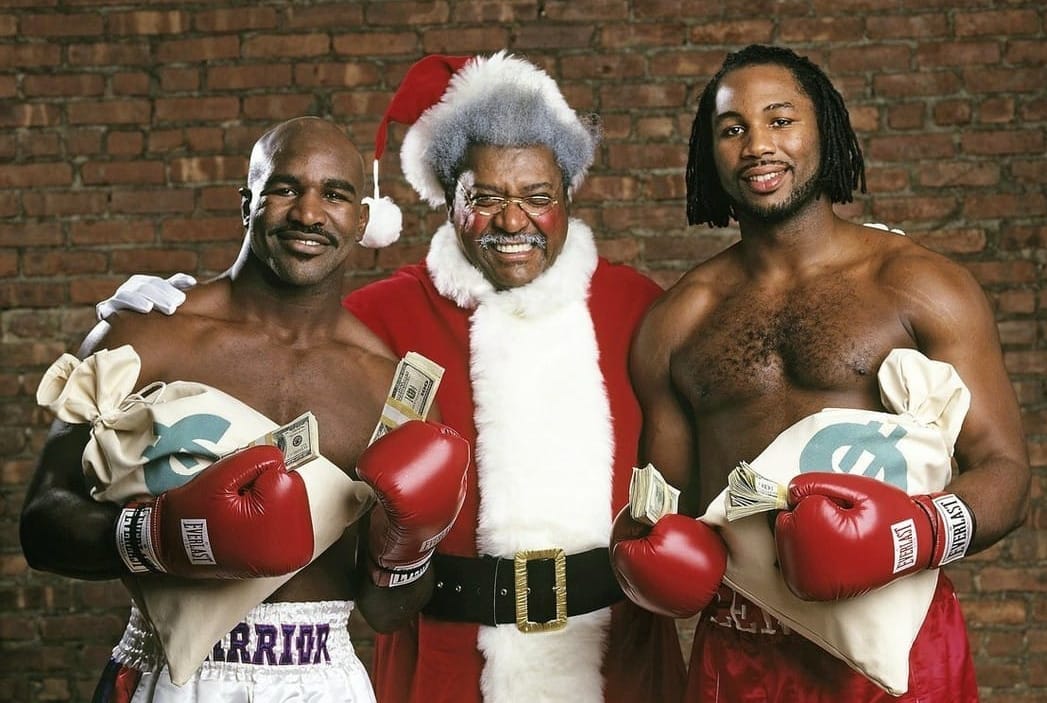
There's levels to this ish. Think about it. The big names that Don King worked with all had nice cars and mansions, they all lived extremely luxurious and financially-comfortable lives. Until the money ran out. Don King will argue it's not his fault that boxers mismanaged their own money. The boxers would see Don King's mansions and cars and wonder why he was so well-off despite never stepping in the ring. There is no event without the boxers.
In the series, 'veteran writer' [sic] Bernard Fernandez recalls Don King once saying that he "made more boxers millionaires than anybody else" but Fernandez is not won over because "they might have been multi-multi-millionaires". Mike Tyson was a multi-multi-millionaire. Are we supposed to feel bad he wasn't a multi-multi-multi-millionaire?
Yes, they were exploited. But who isn't? The CEO of McDonalds makes a gazillion dollars a year without ever having to flip a burger or even set foot in a restaurant. And the people working in the restaurant don't sleep in mansions even though there is no restaurant without the workers. I really don't want this article to turn into a leftist diatribe. This is just more contextualisation for the popular refrain that Don King robbed fighters and how disproportionate the hate for him is.
Buncey tells us Mike Tyson's former managers "[Bill] Cayton and [Jim] Jacobs were smart. They controlled King's love of money and were fair and paid Tyson more than he was entitled to. They actually did." Except they actually didn't. But it doesn't matter. King was the epitome of evil. Cayton and Jacobs, who coincidentally happen to be white, were faultless angels. "King had to poison Tyson against Cayton. King knew that Cayton and Jacobs weren't stealing Mike's money, but King wanted to take control." It doesn't matter that Mike Tyson himself said Cayton and Jacobs "were like slavemasters" for making him sign an exploitative contract at a young age and even sued them, that part of the story can be whitewashed.
I don't know who the CEO of McDonalds is. I doubt you do either. But if he was as brazen a jerk as Don King could be, we probably would be more familiar with that figure. However, the brazen jerks of today, with their cybertrucks or braindead livestreams/podcasts, have detractors and yet still have legions of defenders. And for guys like Cayton and Jacobs it's de mortuis nil nisi bonum. Nobody stands up to say that the hate for Don King is excessive.
All that said, it's worth keeping in mind that King made it easy to dislike him, like the times he exploited race to his own advantage. Sometimes cynically. When courting black boxers, the seductive language of solidarity and black independence from white powerbrokers proved devastatingly effective. When fielding questions from white reporters or investigators, it was a topic that could pivot away from all their pesky criticism. When carving his image in sports culture's Mount Rushmore, he did so with a unique selling point that rivals and contemporaries could not boast. That always-smiling black face upset so many people.
He was a ruthless capitalist. He played zero-sum games and won them. He would press his financial advantage over the weak. He would press his unfair contracts on the vulnerable. The laws that governed his life were unfair. He rewrote the rules when it suited him. He was a man of his word if you cornered him into shaking your hand. He was never supposed to make it. He was impossible. He did the impossible. Unequaled. Truly, one of the most American men who ever lived.
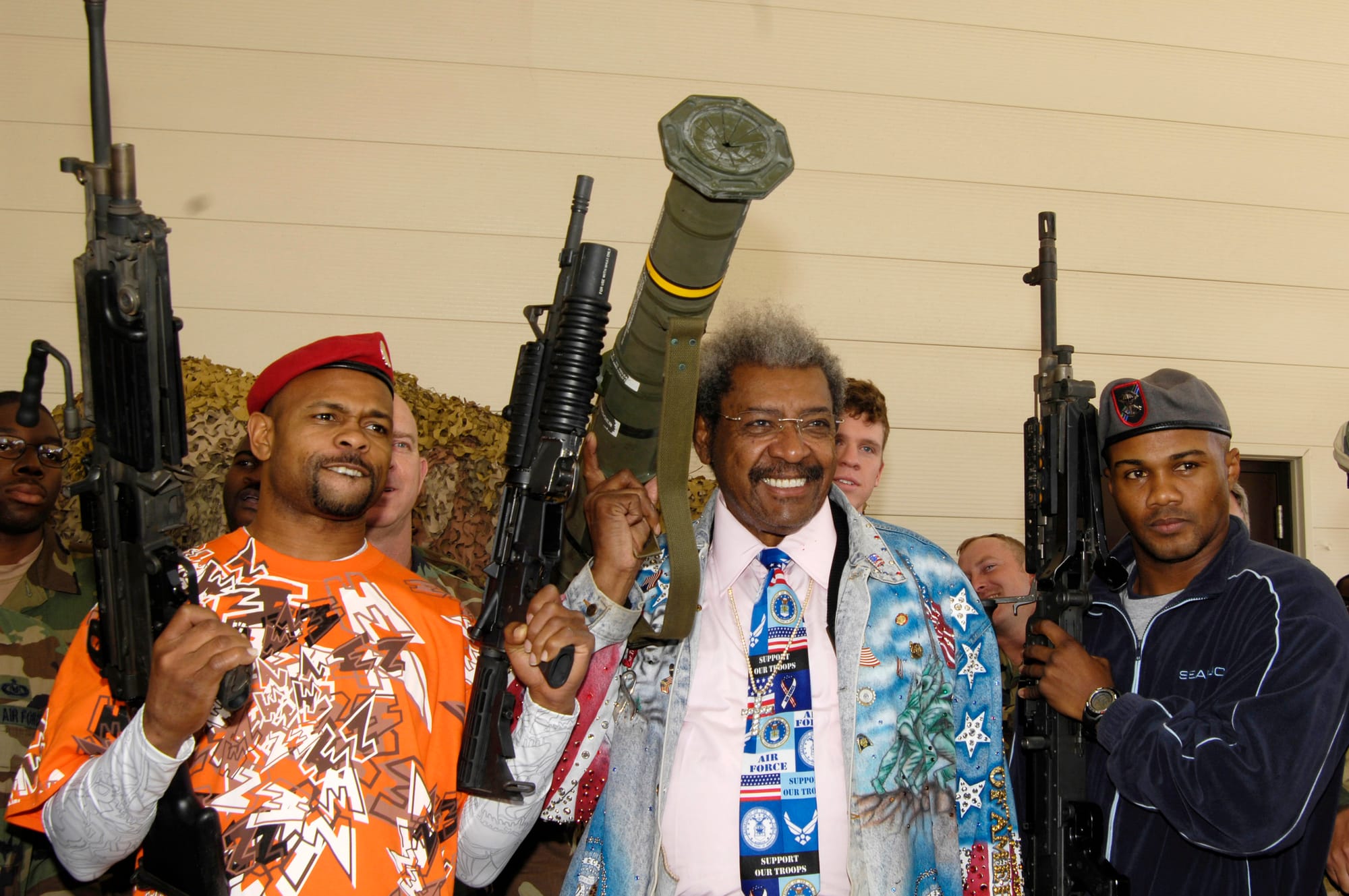
Oh right! This was meant to be about the podcast series. Ummm... idk, it's essentially The House of Steve Bunce with guest appearances from Lennox Lewis. And sometimes they talk about Don King. My favourite part is how, despite both having dealt Don King in a professional capacity and speaking for hours about how he wrongs everyone he meets, they repeatedly cannot come up with a single example of him wronging either of them.
Bunce: So basically you were judging him on what you'd heard and what they were telling you?
LEWIS: Yes.
BUNCE: More than like you'd sat down with him and he said to you "look, I'm gonna give you 10 million but not gonna give you 10 million, I'm only gonna give you 2 million, you're gonna say you got 10 million" so it wasn't anything he actually said to you or did to you?
LEWIS: No.
BUNCE: It was just reputation?
LEWIS: Yeah, reputation.
Quelle surprise! Rather than consider the possibility he might not be the devil, Lewis agrees with Bunce that it's further evidence of how much of a devil King was for hiding it so well. The Don King paradox, where innocence becomes incontrovertible proof of guilt. And the only recourse is rounding up a posse to lynch his reputation.
Don King survived the mob, but few people survive mob justice.
Final Review Scores
In a word: Testing
In a SpongeBob quote: "He poisoned our water supply, burned our crops and delivered a plague unto our houses!"
In a number: 2.23
In an emoji: 👎🏾
In a type of chair: One of those intentionally uncomfortable anti-homeless benches
'Powerplay: The House of Don King'
Presented by Steve Bunce and Lennox Lewis
Written by Steve Bunce
Runtime: 8-part series, 25-40 minute episodes
Produced by Simon Cross, Mike Holt, and Darren Rees
A Shooting Shark Production
Available on BBC Sounds (and presumably any good podcast slop farm)
BONUS! - Petty nitpicks and pontifications
- There are other documentaries, podcast series, and books about Don King. But I'm not going to go through them all just so I can say which is the best one. All you really need to know is that this one probably ain't it, chief.
- I don't like it when Steve Bunce calls a black man 'boy'.
- Bunce admits to not knowing what the numbers racket was, which is a tacit admission he's never read The Autobiography of Malcolm X.
- They also gloss over why/how Don King became so successful in the numbers game. The guy was highly numerate and had a very good memory.
- Thomas Hauser probably deserves billing as third presenter on this series, I'm not going to count lines but I'm confident we hear more from him than any archive Don King material.
- At one point Bunce asks Lewis: "What was the pre-Don King Mike Tyson like? What was the pure and innocent Mike Tyson like?"
- lol. lmao even.
- The radio reports of Don King's arrest and Sam Garrett's death are of suspiciously good quality, it almost sounds like they were recorded just for this series.
- Assuming that 1966 local radio reports from Cleveland do all survive in some archive somewhere, how likely is it that these events would have been top stories in the era before 24-hour news?
- The music was meh overall, especially the hip hop instrumental that sounds like it's available on YouTube under the title "90S WEST COAST G-FUNK GANGSTA RAP BEAT [FREE]". And the theme music is so unfitting.
- Don Elbaum gets mentioned a few times, which is a deeper cut than I thought they would make. imo they missed a trick not interviewing him because he's a certifiable character.
- Kellie Maloney, former manager of Lennox Lewis, is mentioned occasionally. She gets deadnamed by Bunce without fail. FWIW I have no reason to suspect he's rabidly anti-trans. I think he's ignorant enough to think it makes him appear knowledgeable, a little 'here's something you might not know that I do', like when he reminds people of Muhammad Ali's slave name.
- To the best of my Google-fu, Don King met US Presidents Jimmy Carter, George H.W. Bush, Ill Clinton, George "Dubya" Bush, and Teflon Don.
- Gerald Ford was presumably busy with other matters. Obama and Biden have no interest in boxing and if I had to guess, probably lacked interest in meeting an ex-convict who campaigned against their party.
- King reportedly met and/or was friends with Ronald Reagan, I'm inclined to believe it despite not being able to find photographic proof.
- Modern retellings of King's manslaughter conviction accept that King killed Garrett over a $600 gambling debt. The real amount was technically $300, as the actual disagreement was over differing interpretations on how big a numbers payoff was supposed to be.
- Yes, King grew up in a racist society. Bunce's opinion that, when arrested, "[King] was lucky the policeman never shot him dead" is undoubtedly formed by the image of the warrior cop, emblematic of police militarisation. But that militarisation has increased over the decades, meaning it was less likely to be the case in the past.
- The police officer who made the arrest recall the events in a 1991 Frontline documentary about Don King. King was armed (as he was pistol-whipping Garrett), the officer said "drop the gun", and King complied. This is how events are supposed to unfold in a normal society. Pretending it's abnormal gives cover to the abnormality of our current times.
- Those officers would've been trained during the crime trough of the mid-'30s to the mid-'60s and we have data on how police of that era responded to situations. America is currently experiencing another crime trough. Yet thanks to militarisation and legal protections won by police unions in recent decades, police violence has risen. The Cleveland PD officers that arrested Don King in 1966 are not cut from the same cloth as the Cleveland PD officers that murdered Tamir Rice in 2014.
- The police officer who made the arrest recall the events in a 1991 Frontline documentary about Don King. King was armed (as he was pistol-whipping Garrett), the officer said "drop the gun", and King complied. This is how events are supposed to unfold in a normal society. Pretending it's abnormal gives cover to the abnormality of our current times.
- Barry "we were slave traders!" Hearn tells an anecdote about how a huge, menacing black man walked into Don King's office with a gun holstered in his jacket. Hearn assumed that violence was inevitable and was astonished that there wasn't a shootout between the two black men. I'm amazed people continue to let him wistfully spout anecdotes from the 20th century.
- Colin Hart, former boxing writer for Newscorp tabloid rag, *** ***, tells the story of being in a hotel conference room with a gaggle of journalists in Caracas where "suddenly, in walks, and i'm not exaggerating, three or four – I remember – sinister-looking [uncomfortable pause] Africans, wearing tunics like they wear in China"
- In Episode 6, boxing expert Steve Bunce calls José Torres "the former world heavyweight champion", Torres was actually former light-heavyweight champion.
- "Let's just pause for a second here, Big Len" 💀
- Even the BBC Media Centre announcement for this series ends with quoting Lennox Lewis as saying “Don King was a giant figure out there, you heard about his name and you knew who he was involved with and you knew his reputation. Stories get around very quickly and reputations get around very quickly.”
- Bunce cries about King accidentally using the N-word when endorsing "his old pal Donald Trump". King had even "used that word for decades". I for one am shocked, shocked I say!
- They censored King's utterance of the n-word, though not the other n-word, even though the series already carries a strong language warning.
- Everytime I hear Gerry Cooney's soft-spoken voice I can't help but feel he's one of the most endearing figures we've ever had in heavyweight boxing, it only makes the ugliness he became wrapped up in with the Holmes fight that much more sad.
- Maybe it's just because I'm not a Steve Bunce fan. But I really don't get how people enjoy listening to him. This is about the aftermath of the charity show that put King on the map.
- LEWIS (obviously reading): The event raised $87,000.
- BUNCE (obviously waffling): Well, I actually know the figures and they're quite staggering. They're quite ridiculous. They're just ridi- they're absolutely mad. $87,000 was raised, ok? Ali got ten thousand. Ten grand. That's not bad, y'know? I mean you gotta pay a man his expenses. He's come down, that's understandable. Giorgetti got fifteen-hundred, he had to find people. Elbaum got less than fifteen-hundred 'cause he had to do a lot organising [sic]. The figure that the hospital finally received has been – yeah, you won't be shocked to find out – it's been disputed. Let's just put it this way, the hospital said they didn't get enough.
- My heart goes out to whoever was tasked with editing the audio on this series.
- I didn't mean to transcribe this much but Buncyisms remind me of Trumpisms and that's the best way to illustrate the nonsense; it's just battering you with inane ramblings in a stream of consciousness and asking a question in three or four sometimes different ways when one would suffice.
- I do not trust the FBI. Steve Bunce wouldn't either if he had any intelligence to counter.
- This "banter", mein Gott. Mein Gott, this "banter".
- LEWIS: [Don King]'s a sweet-talker. And people love when you say nice things about them.
- BUNCE: They love it when you praise them. And fighters, I mean you know, sometimes, you guys, even though you get all the praise in the world, sometimes you'd like a little bit more praise.
- LEWIS: Yeah, absolutely.
- BUNCE: Just to be told how good you are.
- LEWIS: Yes. And he's the king at that.
- BUNCE: Are you still that way now, Lennox? Now that you're a grown man. An adult. Married, with like, with kids. Are you still that way now? Do you still need to be told how good you were?
- LEWIS: Yeah, of course. You kno-
- BUNCE: [interrupts by breaking into a laughing fit]
- LEWIS: [awkwardly laughing bc he doesn't know what's funny] It's great, you know?
- BUNCE: [squeals with delight like he just got away with robbing Gotham City Bank]
- Both Bernard Fernandez and Matt Christie (now former editor of Boxing News) accuse Don King of "playing the race card", the caucacity is qwhite somethin' i tell ya hwhat
- Episode 7 ending with Bunce telling listeners Don King "is still out there!" like he's the boogeyman was extremely funny.